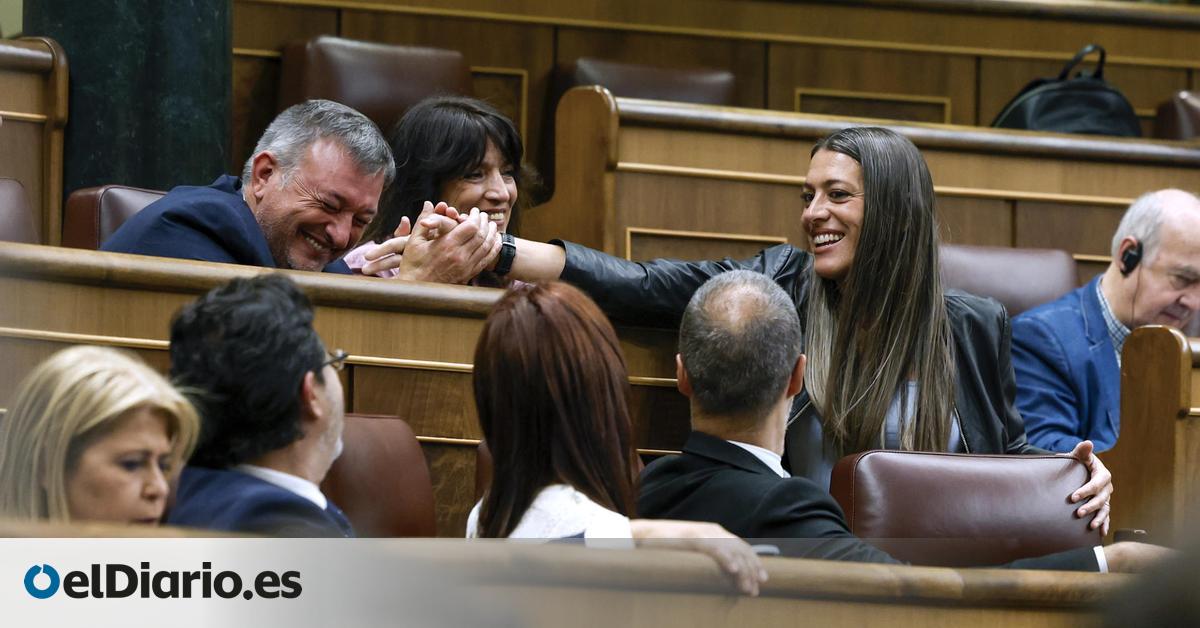
The historic amnesty law is now a reality. After this Thursday’s Plenary Session, which at times has tried to explode the extreme right with insults, shouts and interruptions during the intervention of the socialist deputy who defended the norm, the Congress of Deputies has given the definitive green light to the grace measure that puts the end point to the criminal consequences derived from the process.
The absolute majority of the Chamber, with 177 votes in favor and 172 against – a representative from Podemos was absent from the Plenary due to personal reasons – has supported a rule that the deputies from PP, Vox, UPN and the Canary Coalition have rejected in a session that the independence movement has defined as “historic”. Leaders of ERC and Junts, some of them sentenced to prison and later pardoned, such as Oriol Junqueras, Carme Forcadell and Jordi Turrull, attended the parliamentary debate and the vote from the guest gallery. Among the seats of the Catalan deputies there are those who have not been able to hold back their tears.
“It is not forgiveness or clemency, it is victory,” Junts spokesperson Míriam Nogueras wanted to claim, to banish the idea that the pro-independence groups have lost the pulse they launched in the state in 2017. Nogueras has taken advantage of her intervention to reproach the PP and PSOE the criminal punishment that resulted from the October 1 referendum and the subsequent unilateral declaration of independence. “Let’s not be confused, we should never have needed the amnesty nor would we have gotten this far if the State had made a real transition, especially in the judicial leadership. We would not have arrived here if the Government had applied the resolutions of the UN working group on Catalan exiles and political prisoners. If the PP and the PSOE had not actively promoted and participated in the repression,” she noted.
The ERC spokesperson, Gabriel Rufián, also began his intervention on the platform with an allusion to the State. “It is a historic day because we are facing the first defeat of the 1978 regime. Today is not just a good day for some ideas or a cause, today is a good day for an entire country, for its democracy and freedom,” he defended. in a speech in which he warned that this amnesty law is not a final step.
“If you have memory, you will understand me. Next stop: referendum. And whoever laughs, remember what was said here about the amnesty four, three, two years ago,” he said in reference to the speeches of the Socialist Party that denied the possibility of a text of criminal oblivion for those prosecuted by the process. like the one that Congress definitively approved this Thursday.
The moment of greatest tension has come with the parliamentary intervention of the leader of Vox, Santiago Abascal. The leader of the far-right has set the chamber on fire with a speech against the Government, Sánchez and his associates for the approval of the amnesty, a law that he has described as a “coup” and the “greatest attack against the Constitution” perpetrated since 1978.
Abascal has attacked all of Sánchez’s partners, both in Spain and internationally, and that in his opinion “denotes the extremism into which they have fallen.” “Here who supports them are the executors of ETA and the delegates of the fugitive from justice Puigdemont.” And “at the international level,” he added, “they are only congratulated by Hamas, the Taliban, Iran, a theocratic regime that murders women” or “the Puebla group of the narco-governments of Latin America,” “In reality they are very alone,” he added. concluded. “Even so, we believe that the worst for Sánchez is yet to come,” stated Abascal.
During his turn, the far-right leader referred to Sumar deputy Gerardo Pisarello—who spoke just before the ultra deputy—as an “enemy of Spain.” “I am the grandson of Andalusian republicans. I feel proudly Catalan and proudly Latin American, and even if I were from Senegal, or outside of Donosti, I would tell you that those of us who work and live here do not accept any lessons from the gentlemen who have always lived from stories,” Pisarello responded. Several Vox deputies have risen from their chairs to rebuke the socialist deputy who was speaking at that moment and whom they have called—for several minutes, loudly and with gesticulations involved—“traitor” or “corrupt.” Insults that have also been subsequently uttered against Pedro Sánchez.
Given the absence of the President of the Government throughout the plenary session until the moment of the vote and the decision of the Executive not to intervene during the debate, the spokesperson chosen by the PSOE to defend the most important norm of the legislature was the deputy Artemi Rallo. , who has taken advantage of a good part of his turn to attack the PP for boycotting it. Rallo has accused Alberto Núñez Feijóo of boycotting its processing, of manipulating the institutions and of even proposing the outlawing of the independence parties. “The PP has staged the most embarrassing spectacle of gross manipulation of institutions,” he lamented.
The socialist deputy reminded Feijóo that he did all this while “privately they studied the amnesty and ruled out terrorism.” “He has trusted everything to engulf those nostalgic for Francoism. But you will be the one devoured. Devoured by his own, who are not going to give him another chimerical victory. And devoured by the neo-fascist beast that runs through Spain and Europe, that monster that Spaniards will vote for at the polls: hope, justice and dignity,” the socialist spokesperson concluded.
The person in charge of closing the speaking session was the leader of the PP, Alberto Núñez Feijóo, who focused his speech on attacking the President of the Government and the Socialist Party, which he considered dead. “Today we witnessed the death certificate of the Spanish Socialist Workers Party. Today we tell you, from the Constitution, you stay with the ambition of a single man, we have not been elected to lie.” Until the last moment, Feijóo has asked for the withdrawal of the rule and the calling of elections, just over a week before Spaniards vote in the European elections.
“We should ask ourselves how much we Spaniards are worth to candidate Sánchez. We already know, seven votes,” said Feijóo. “How much is the Presidency of the Government worth? Whatever they ask of you. How much is impunity worth? “How much is it worth not having to respond to the courts, not paying with jail or fines for the alleged commission of crimes,” he continued. “If someone took public funds and gave them to politicians in exchange for making him president, we would say that it is corruption; But if he erases some crimes, what is it? Don’t dare call it coexistence, don’t laugh at the Spanish. “Don’t try to brainwash the Spaniards,” he said.
Six months of processing
During its almost six-month journey in Congress, the text has undergone several modifications. After its first phase of debate in the Justice Commission, the law was brought to the Plenary Session on January 30, but was defeated by Junts’ vote against it. Those of Carles Puigdemont forced his return to the commission due to the refusal of the PSOE to accept his amendments on the crimes of terrorism and treason and led the pardon measure to a new negotiation.
The final agreement in Congress was reached in the plenary session on March 14 and it was then that the law was sent to the Senate. In the Upper House, the PP made use of its absolute majority to carry out a regulatory modification that allowed it to ‘retain’ the rule there for two months, the maximum set by the Constitution, despite being processed through the emergency procedure.
With the PP voting against, the Senate Plenary Vetoed the law two weeks ago and returned it to Congress without including modifications. Independence leaders such as the leader of Esquerra (ERC), Oriol Junqueras, the general secretary of Junts, Jordi Turull, the former president of the Catalan Parliament, Carme Forcadell, the ERC spokesperson and deputy general secretary, Marta Vilalta, and the vice president of the Generalitat in office, Laura Vilagrà, attended the Plenary Session of Congress this Thursday to attend a day defined as “historic” by ERC and Junts.
The approval of the law, and its publication in the BOE, will imply its entry into force, but not its immediate application. The rule establishes a period of two months for each judge who investigates a case that may be modified by the amnesty to apply it. But, in addition, it is foreseeable that different types of appeals will be raised against the norm. From those that parties and judges can bring to the Constitutional Court, as well as before supranational jurisdictional bodies, such as the Court of Justice of the EU, among others.
Source: www.eldiario.es

